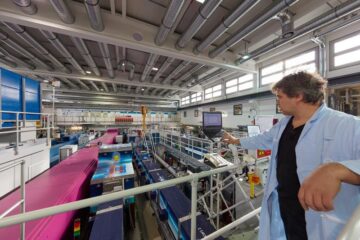C4 Plant SelectiveHerbicide – New approach to combat C4 weeds in arable crops

Weed infestations cause considerable crop yield losses worldwide. C4 weeds like Black-Grass, Cleavers, Green foxtail, Kochia and Barnyard Grass reduce yields of important C3 cereals such as rice, wheat, barley and oat. For example, Barnyard Grass, the most important weed species in rice, which is now found in over 60 countries ranging from North America to South Asia provokes yield losses of up to 70 %. Similarly, Black-Grass has become a severe threat for global food production causing yield losses of 5 to 50 % already in Western Europe. Besides, the resistance to existing herbicides is increasing – provoking the need for alternative weed killers.
Selective herbicides against C4 plants would be of outmost importance for the agribusiness and a major turning point in the control of the worst weeds in the world. Scientists of the Heinrich Heine University Duesseldorf succeeded in finding a sophisticated way to sustainably and selectively inhibit C4 type phosphoenolpyruvate (PEP) carboxylase, an enzyme that has an important role in CO2 fixation and exists in all variants of C4 metabolism. In contrast to existing approaches the small molecules regarding the present invention do not bind to C3 type PEP carboxylases although these enzymes show sequence identity of up to 95% with the C4 enzyme. Hence they do not affect the C3 metabolism. Consequently, C3 plants prosper well, C4 plants do not.
Weitere Informationen: PDF
PROvendis GmbH
Tel.: +49 (0)208/94105 10
Ansprechpartner
Dipl.-Ing. Alfred Schillert
Media Contact
Alle Nachrichten aus der Kategorie: Technologieangebote
Neueste Beiträge

Bakterien für klimaneutrale Chemikalien der Zukunft
Forschende an der ETH Zürich haben Bakterien im Labor so herangezüchtet, dass sie Methanol effizient verwerten können. Jetzt lässt sich der Stoffwechsel dieser Bakterien anzapfen, um wertvolle Produkte herzustellen, die…

Batterien: Heute die Materialien von morgen modellieren
Welche Faktoren bestimmen, wie schnell sich eine Batterie laden lässt? Dieser und weiteren Fragen gehen Forschende am Karlsruher Institut für Technologie (KIT) mit computergestützten Simulationen nach. Mikrostrukturmodelle tragen dazu bei,…

Porosität von Sedimentgestein mit Neutronen untersucht
Forschung am FRM II zu geologischen Lagerstätten. Dauerhafte unterirdische Lagerung von CO2 Poren so klein wie Bakterien Porenmessung mit Neutronen auf den Nanometer genau Ob Sedimentgesteine fossile Kohlenwasserstoffe speichern können…

















